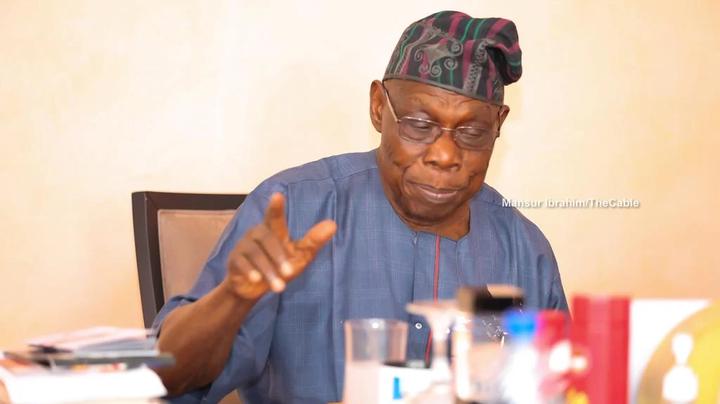According to a report by The Cable News on Monday, August 25, former President Olusegun Obasanjo has once again shared his reflections on Nigeria’s leadership journey, expressing concern about the country’s slow pace of progress and stressing that he has always been in a hurry to see Nigeria reach its full potential.
Speaking while reviewing his years in public service and introducing his new book, Nigeria: Past and Future, Obasanjo explained that he is at a stage in life where he feels “close to the departure lounge,” yet his passion for the nation remains undiminished.
He used the occasion to remind Nigerians of the importance of reflection, documentation, and learning from the past to build a stronger and more united country.
Obasanjo noted that his interventions over the years, whether through speeches, books, or public commentary, have been driven by a sincere desire to see Nigeria progress.
According to him, his writings have never been about animosity or political rivalry but rather about highlighting the mistakes and successes of leadership so that future generations can make informed decisions.
He stressed that his intention has always been to offer guidance where necessary and provide an honest record of Nigeria’s journey.
For him, documentation is not just about history but also about helping the nation chart a clearer path forward.
The former president further explained that his legacy would ultimately speak for him, regardless of how people perceive his time in leadership.
He recalled the different capacities in which he served Nigeria, including his tenure as military head of state and later as a democratically elected president.
Obasanjo also referred to his personal sacrifices, including the period he spent in prison during the military era, noting that such experiences have shaped his understanding of Nigeria’s struggles.
His perspective, he said, comes from having witnessed both the brightest and darkest moments of the country’s political and social development.
In a rather candid reflection, Obasanjo admitted to feeling both anger and sadness about Nigeria’s trajectory.
He argued that the country has often failed to capitalise on opportunities that could have transformed it into a global leader.
At the same time, he acknowledged that there were moments of genuine progress, some of which he believes should not be overlooked.
With hindsight, he said, it is clear that past administrations made mistakes, but they also recorded achievements that contributed positively to Nigeria and Africa as a whole.
His hope is that current and future leaders will focus on correcting those errors while building on the gains that were achieved.
Obasanjo’s new book, Nigeria: Past and Future, delves into these reflections more deeply, providing an assessment of the country’s leadership over several decades.
In it, he not only critiques past and present administrations but also outlines possible solutions for the nation’s challenges.
He argued that Nigeria still has the potential for greatness, provided its leaders embrace accountability, inclusiveness, and visionary planning.
For him, the real task is ensuring that ordinary Nigerians feel the impact of governance and that the country’s vast resources are utilised responsibly.
As one of Nigeria’s most prominent statesmen, Obasanjo’s comments continue to draw attention both at home and abroad. His reflections serve as a reminder that the nation’s progress depends not only on leadership but also on the collective will of the people.
With the 2027 elections gradually approaching and political debates already heating up, his words stand as both a warning and a challenge to those who aspire to lead.
For Obasanjo, time may be moving fast, but his enduring message remains that Nigeria can still achieve greatness if its leaders and citizens learn from the past and commit to building a better future.
Obasanjo reiterated that his legacy would speak for him, noting that he had served Nigeria in different capacities, endured imprisonment, and witnessed both the best and worst of the nation. “Yes, I am both angry and sad because I have seen the best and the worst of our country. With hindsight, we know we made some mistakes, but again we did some great things in our country, for our country and for Africa,” he said.
Find Verified News At Your fingertips Click The Button Below

